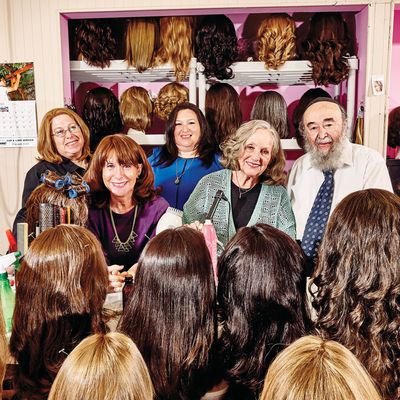
Claire Accuhair
Purveyor of wigs that are the gold standard among married Orthodox women of New York.
Year founded: 1960
Neighborhood: Midwood
Family members on staff: 5
Cost of a custom “dynasty” wig: $2,200
“I was born in Hungary, and we were lucky: We ended up in a displaced-persons camp near Nuremberg for four years — I worked in a wig factory in the German sector — and when I was 17, we came to America. I started the wig shop when I got pregnant with my youngest. My husband made a nice living, but it wasn’t enough for me. I have very expensive tastes. And nobody makes a wig like me. It takes about 35 to 45 hours — each hair is tied separately. I used to have a whole building with 20 employees, but unfortunately, people went for cheaper wigs. They don’t care how they look anymore. I think they all look atrocious. I can’t understand how these people only drive Bentleys and Rolls-Royces and they wear those horrible sheitels. I’m looking for a business partner to help revitalize things, and if I don’t find one, I will retire. It would be a pity because if there are any like myself, they are very few and far between.” —Claire Grunwald
“Hair has never been my thing. I never had any desire to learn; it’s like wanting to play the piano. It’s a talent. I don’t think my mom is disappointed in me. I don’t think she ever expected it from me. I think from my other two sisters she would have liked it, but it is what it is. You have to have a certain personality to work with your family. I could never work with my husband. It took me a while to learn how to work with my sisters, and be professional, and not say, ‘I’m going to tell Mommy on you.’ ” —Silky Pitterman
“A lot has changed. When we were originally here on Coney Island Ave., you had Jews and non-Jews wearing wigs because you had big hair, it was the ’60s. So we had all different types. And then with the ’70s, when the flat hair came in, then it was mostly the Orthodox crowd because you had enough hair for those hairdos. I’m sure there was cancer and alopecia before, but somehow we’re seeing more of it now.” —Chanie Handler
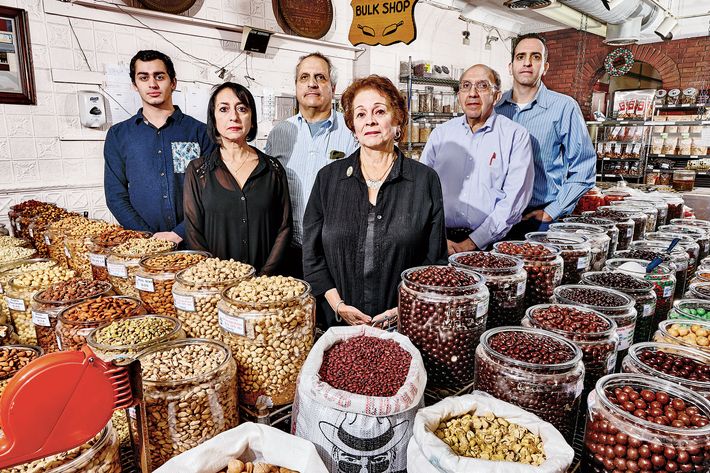
Sahadi’s
A beloved pre-gentrified Brooklyn grocery known for its sea of bulk bins.
Year founded: 1941
Neighborhood: Brooklyn Heights
Family members on staff: 8
Year it introduced balsamic vinegar: 1978
“The neighborhood the store’s in, it’s very smart. A lot of foodies. We still keep our Middle Eastern base, who come in from New Jersey and Long Island, but we’ve seen a big uptick in — I hate to use this old word, but — yuppies. I don’t know what the newest phrase is. My daughter Christine and I started the deli years ago. And hummus, sure, but lentils and rice? Couscous? I didn’t think people were going to go for that, but my goodness. Charlie and I met in high school. We’ve been married 51 years. We leave together in the morning, but I come home an hour earlier. When he pulls into the driveway and he walks in the door, I look at him, he looks at me, and he’s probably saying to himself, ‘Here she is again,’ and I’m saying, ‘Oh, gee, I wish I had another hour to myself.’ It’s not easy being together 23 hours a day, let me tell you! Our whole family lives close to each other in Bay Ridge, although it’s not a drop-in kind of thing. We respect each other’s privacy. When I come home after a long day, and I’m so exhausted, and I hear my grandchildren in the backyard, I will just close the shades a little bit.” —Audrey Sahadi
“Look, if you want the next generation to carry the business forward, you can’t keep interfering. You gotta back up. My kids are going to make their own mistakes like I made growing up—except they’re much older than I was when I started. I was really a kid. My dad passed when I was 23. I’ve been the boss for a long time. My children are both in their forties. They have so much experience. They’ve been watching and learning and running the business for the last five or six years. It’s not a difficult transition now for them. And for me, if I back away and let them do their thing without interfering, it’ll make everything run better.” —Charlie Sahadi, founder’s son, co-owner, recently retired
“Anytime I’m home and not doing anything, I’m at the store. You definitely feel like you’re part of something bigger, kind of a legacy. I think that’s been clear to all of us in the family. I’m very proud to be the first in line to run the store. My sister, she’s never really been interested.” —Michael Whelan
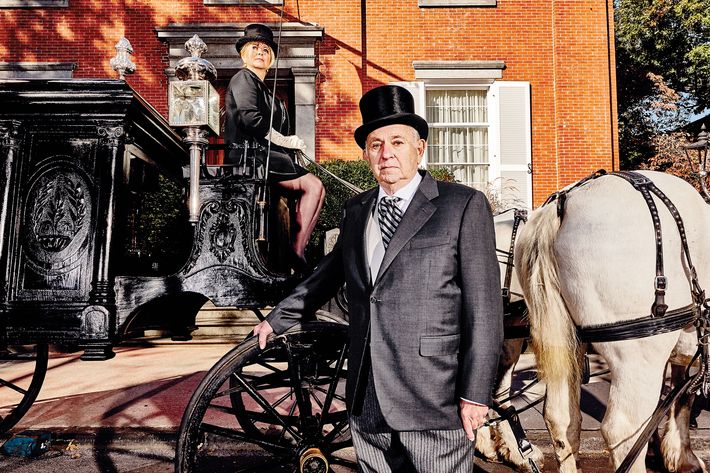
F.G. Guido Funeral Home
Brooklyn’s first Italian undertakers; housed in a stately Greek Revival on Clinton Street.
Year founded: 1883
Neighborhood: Carroll Gardens
Family members on staff: 2
Horse-drawn carriages in the basement: 10
“I didn’t want to be the funeral director. My father convinced me. I guess I could have been a schoolteacher. If my daughter hadn’t joined the business, we couldn’t have continued. She’s better than me; women are more apologetic to families and all that.” —Frank Guido
“It was tough growing up here. I had a cat I would dress up, and we’d come downstairs in the middle of the funerals to make people happy. I went to college, was going for my master’s, the next thing you know, I was doing this.” —Maria-Ray Guido
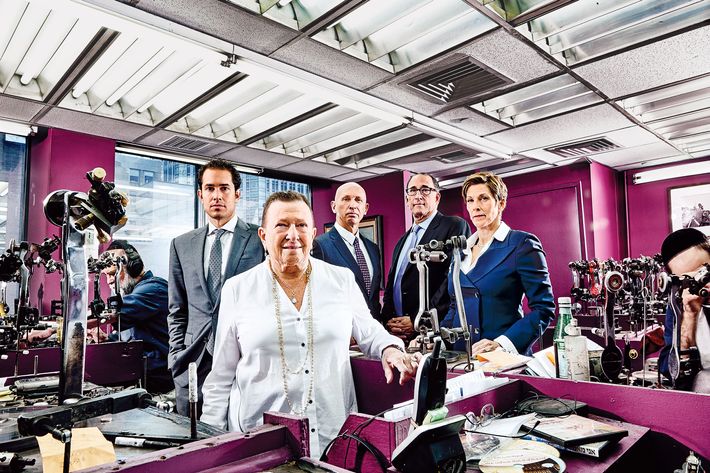
William Goldberg
One of the city’s leading diamond families, and one of the first to move from 47th Street.
Year founded: 1952
Neighborhood: Midtown
Family members on staff: 5
Diamond cutters employed: 10
“We’re in challenging times. A lot of countries are very quiet. The Russians were a huge part of our business — so many would come here. They’re a fun people to sell to. The husband’s sitting there, you never know who’s the girlfriend or the wife, and over the course of half an hour, they’re buying
a million dollars’ worth. The money’s wired the next day. You can still be holding the inventory, and the money’s in your account. When business was good with the Russians, it was enormous business. They’ve gone totally dormant.” —Barry Berg
“This business is very male-dominated. My sister and I, it didn’t matter what our role was, but if our father was here at six, seven o’clock at night with a client, and were sitting at our desks, and this client wanted a cup of coffee, and my brother was there, my brother-in-law was there. It would be, ‘Deborah, Eve, can you get us a cup of coffee?’ It was like, Are you kidding me? Doesn’t matter if you’re working on a million-dollar deal, the women were still in a different role. Really, the greatest thing about working here is being able to be with my mother every day, because she’s turning 86 and she still comes in. Everyone loves having her around. She’ll come around and give everyone a kiss good morning.” —Eve Goldberg
“I never walked in here with the mentality like, ‘I’m Ben Goldberg, I’m William Goldberg’s grandson.’ I truly think I’ve been treated exactly like everyone else. I don’t get more vacation. We’re here from nine to five? I get here at 8:30, and I leave at 5:30.’ I’m the only one of the next generation, but I don’t see myself becoming ‘the boss.’ It’s not my style.” —Ben Goldberg
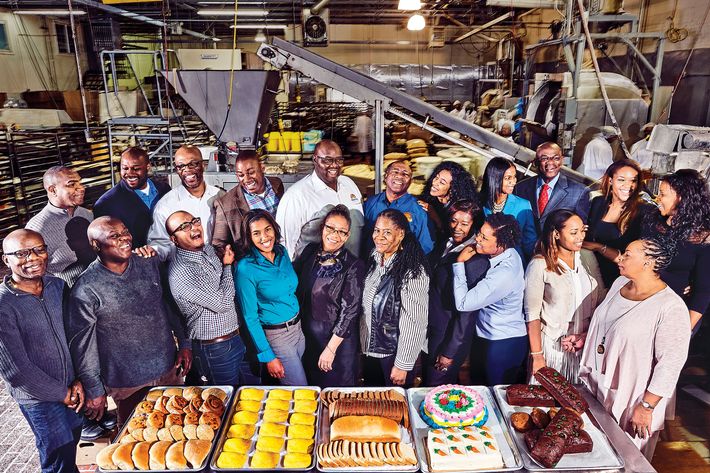
Golden Krust
The city’s largest locally owned restaurant chain; famous for its Jamaican patties.
Year founded: 1989
Neighborhood: Claremont, the Bronx
Family members on staff: 26
Number of franchise locations: 120
“If this weren’t a family business, I think I’d be playing golf or tennis somewhere. But if I’m telling my nine siblings and their wives and everyone to come to work every day, I’d better come to work. I still have to work harder than anyone else. Now we’ve got to get the next generation ready. I have plans in place, and when that time comes, the person will know who he or she is. I haven’t told them yet. But I know.” —Lowell Hawthorne, founder and CEO
“At the end of the day, the buck stops with Dad. Mr. Hawthorne. But he’s good at hearing everyone out. I’m a first-generation American, as with my brothers and sisters, and we may have a different opinion about a flavor profile than those who came up from Jamaica. In college, Dad would call us: ‘What are the mainstreamers thinking?’ ” —Daren Hawthorne
“There’s one sibling of mine who has never worked in the business. He was a professor at Long Island University, and then became a high-school teacher, and never thought about deviating from teaching. People asked him to join. He’s a mathematician and would say, ‘If you need something done with statistics, I’m happy to help.’ I guess somebody has to be different. Out of 11, it’s just one.” —Lorraine Hawthorne-Morrison
*A version of this article appears in the January 25, 2016 issue of New York Magazine.





























